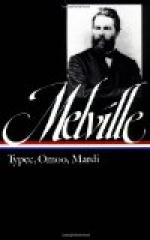Yet, the men of Vivenza were no dastards; not to lie, coming from lion-like loins, they were a lion-loined race. Did not their bards pronounce them a fresh start in the Mardian species; requiring a new world for their full development? For be it known, that the great land of Kolumbo, no inconsiderable part of which was embraced by Vivenza, was the last island discovered in the Archipelago.
In good round truth, and as if an impartialist from Arcturus spoke it, Vivenza was a noble land. Like a young tropic tree she stood, laden down with greenness, myriad blossoms, and the ripened fruit thick-hanging from one bough. She was promising as the morning.
Or Vivenza might be likened to St. John, feeding on locusts and wild honey, and with prophetic voice, crying to the nations from the wilderness. Or, child-like, standing among the old robed kings and emperors of the Archipelago, Vivenza seemed a young Messiah, to whose discourse the bearded Rabbis bowed.
So seemed Vivenza in its better aspect. Nevertheless, Vivenza was a braggadocio in Mardi; the only brave one ever known. As an army of spurred and crested roosters, her people chanticleered at the resplendent rising of their sun. For shame, Vivenza! Whence thy undoubted valor? Did ye not bring it with ye from the bold old shores of Dominora, where there is a fullness of it left? What isle but Dominora could have supplied thee with that stiff spine of thine?— That heart of boldest beat? Oh, Vivenza! know that true grandeur is too big for a boast; and nations, as well as men, may be too clever to be great.
But what more of King Bello? Notwithstanding his territorial acquisitiveness, and aversion to relinquishing stolen nations, he was yet a glorious old king; rather choleric—a word and a blow—but of a right royal heart. Rail at him as they might, at bottom, all the isles were proud of him. And almost in spite of his rapacity, upon the whole, perhaps, they were the better for his deeds. For if sometimes he did evil with no very virtuous intentions, he had fifty, ways of accomplishing good with the best; and a thousand ways of doing good without meaning it. According to an ancient oracle, the hump-backed monarch was but one of the most conspicuous pieces on a board, where the gods played for their own entertainment.
But here it must not be omitted, that of late, King Bello had somewhat abated his efforts to extend his dominions. Various causes were assigned. Some thought it arose from the fact that already he found his territories too extensive for one scepter to rule; that his more remote colonies largely contributed to his tribulations, without correspondingly contributing to his revenues. Others affirmed that his hump was getting too mighty for him to carry; others still, that the nations were waving too strong for him. With prophetic solemnity, head-shaking sages averred that he was growing older and older had passed his grand climacteric; and though it was a hale old age with him, yet it was not his lusty youth; that though he was daily getting rounder, and rounder in girth, and more florid of face, that these, howbeit, were rather the symptoms of a morbid obesity, than of a healthful robustness. These wise ones predicted that very soon poor Bello would go off in an apoplexy.




